By now, I’ve hopefully busted the myth that all fats are bad for you.
Because it is just that – a myth.
In fact, certain types of fat are pretty much vital in the diet and, if you don’t get enough fat, you could be suffering from some unpleasant side-effects.
Some of my favorite science-backed healthy fats include coconut oil and avocado. But, you know what is also touted as an excellent choice of fats?
Extra virgin olive oil!
Read on to see what the research says about this Mediterranean favorite.
- Nutritional Profile
- Antioxidant Activity
- Anti-Inflammatory Effects
- Anti-Bacterial Properties
- Linked with an Overall Healthy Diet
- Prevents Heart Disease
- Reduces Stroke Risk
- Fights Cancer
- Promotes Brain Health
- Treats Rheumatoid Arthritis
- A Good Choice for Cooking
- Maintains a Healthy Weight
- Prevents Type-2 Diabetes
- Final Thoughts
Table of Contents
+Nutritional Profile
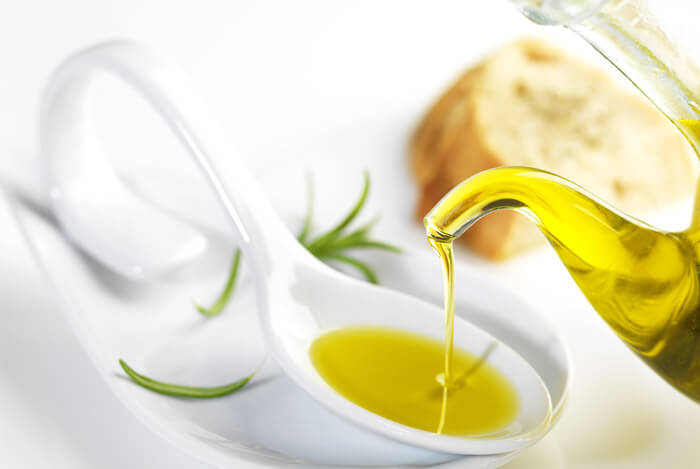
According to the USDA Nutritional Database, one tablespoon of olive oil contains:
- 119 calories
- Vitamin E – 1.94 mg (13% of your Recommended Daily Value – RDV)
- Vitamin K – 8.1 mg (9% RDV)
- Saturated fat – 1.9 g
- Monounsaturated fat – 9.9 g
- Polyunsaturated fat – 10.5 g
As you can see, olive oil contains a number of fats.
Based on the American Heart Organization’s guidelines, no more than 16 g of saturated fat should be consumed a day, if you’re following a 2,000 calorie diet. 1.9 g equates to roughly 12% of that maximum intake.
They also recommend that the majority of the fats you eat should be monounsaturated (MUFA) or polyunsaturated (PUFA), although there is no specific recommended amount.
As you can see, olive oil is high in both MUFAs and PUFAs, and it’s these high levels of ‘good fats’ (particularly the monounsaturated type) that give a simple spoonful of extra virgin olive oil some of its amazing health benefits.
Here are 12 of those benefits.
Antioxidant Activity

Antioxidants are substances that help prevent damage to our body’s cells caused by hazardous oxygen molecules known as ‘free radicals’.
Free radicals contribute to heart disease, cancer, Alzheimer’s disease and other serious illnesses.
Olive oil contains some powerful antioxidants, which means it may help protect us against some of these serious conditions.
According to research published in Nutrition Research Reviews, two chemical compounds (hydroxytyrosol and oleuropein), which give extra virgin olive oil its bitter taste, have exhibited powerful antioxidant activity.
The vitamin E in olive oil also has proven and distinctive antioxidant activities, as does vitamin K.
Anti-Inflammatory Effects

Chronic inflammation is linked to many of today’s most prevalent and serious medical conditions like asthma, allergies, heart disease, cancer and more.
Thanks to its inflammation-fighting properties, extra virgin olive oil can play a role in a healthy meal plan.
One of the monounsaturated fatty acids in olive oil, oleic acid, plays an important role here. Studies show it can reduce the markers of inflammation.
Japanese research, conducted in 2007, looked at the levels of both oleic acid and markers of inflammation in over 3,000 people.
They found that intakes of oleic acid (among other fatty acids) reduced the signs of inflammation in the body, especially when polyunsaturated fat intake is at a moderate level.
Perhaps even more important than oleic acid is the presence of oleocanthal, a type of antioxidant.
Research has found that this substance mimics the effects of ibuprofen, with a 50 gram (1.75 oz) daily dose of olive oil providing 10% of the pain-relieving power of a standard adult dose of ibuprofen.
Anti-Bacterial Properties
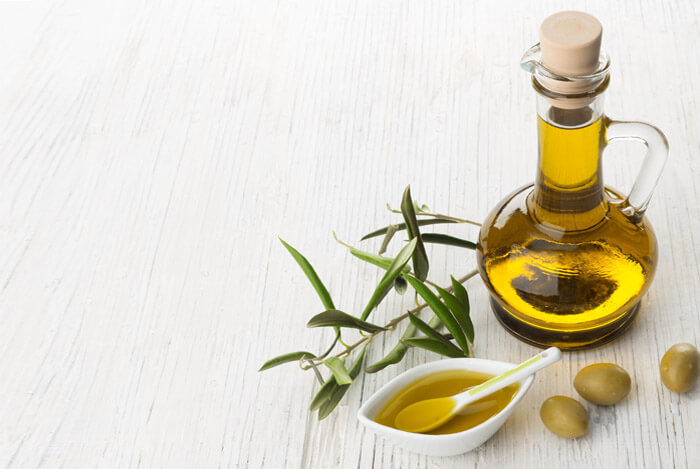
In addition to fighting oxidation and inflammation, extra virgin olive oil has been shown to fight certain types of bacteria.
When several different food items were tested for antibacterial activity, both vinegar and liquid extracts of virgin olive oil showed the strongest activity against all strains of bacteria tested.
Even when virgin olive oil was used in mayonnaise and salads, it reduced the amount of both Salmonella and Listeria present in the food.
Another type of bacteria olive oil is effective against is H. pylori, a nasty bug that is linked to a majority of stomach ulcers and some types of gastric cancer.
An in vitro study has shown that substances in olive oil exert a strong bactericidal activity against eight strains of H. pylori – three of which are even resistant to some antibiotics!
Linked with an Overall Healthy Diet
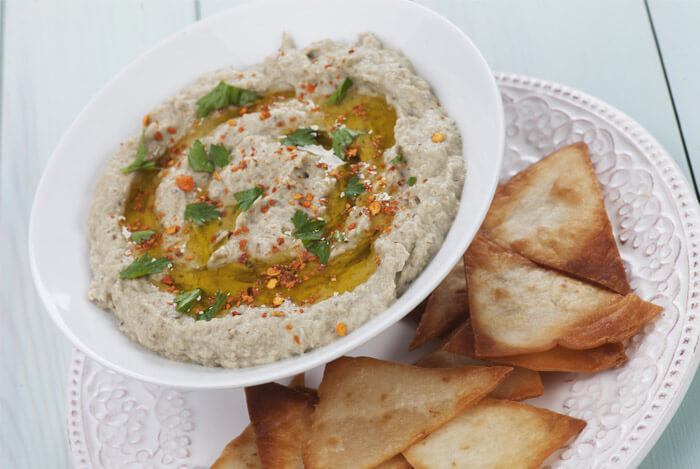
A higher intake of olive oil has been linked with an overall healthier diet.
One study, that looked at 1,600 individuals aged between 18 and 60, found that those with the highest consumption of olive oil (greater than 13.5% of total calories) ate healthier foods.
Not only did they eat less cereal, baked goods, whole milk, sausages, candy, fruit juice and sodas, but they also enjoyed more fish, eggs, vegetables and added fats.
Unsurprisingly, those with the highest olive oil consumption also demonstrated high total fat intake, but saturated fats accounted for only a small amount of this. They also tended to more than meet their vitamin requirements.
Of course, the research isn’t saying that simply eating more olive oil will cause you to miraculously eat more healthily – it’s just saying there is a link.
Perhaps those who consume more olive oil do so as they stick to a Mediterranean-style diet, which is also rich in whole grains, fish and vegetables.
Prevents Heart Disease
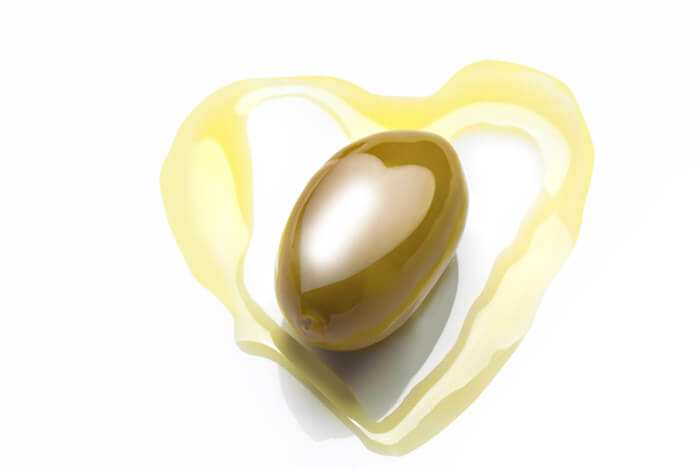
Numerous studies have shown that following a Mediterranean diet promotes heart health.
One such study enrolled 7,447 participants, aged between 55 to 80, who did not have heart disease but who were at high risk for it.
Participants were assigned to one of three diets: a Mediterranean diet, supplemented with extra virgin olive oil; a Mediterranean diet supplemented with nuts; and a control diet.
The researchers discovered that the diets supplemented with extra virgin olive oil or nuts reduced the incidence of major cardiovascular events.
A review of 11 previous pieces of research into the heart benefits of the Mediterranean diet, of which a key feature is olive oil, found that this type of healthy eating has favorable effects on cardiovascular risk factors.
Olive oil alone has been shown to reduce high blood pressure levels (hypertension) – one of the biggest risk factors for heart disease.
One study published in 2000 has shown that regularly eating olive oil can reduce the need for prescribed hypertension drugs by up to 48%.
Reduces Stroke Risk
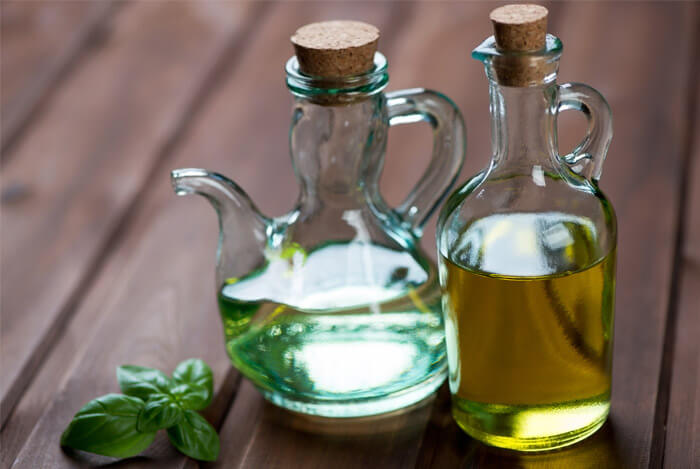
Two large bodies of research have shown that olive oil can offer protection against the risk of stroke.
One of the research pieces was an analysis that looked at 32 cohort studies involving 841,211 subjects, to determine the effects of various types of monounsaturated fatty acids.
Of all the fats studied, reviewers only found ‘significant associations’ between higher intakes of olive oil and reduced risk of death by any cause, cardiovascular events, and stroke – with stroke risk being reduced by 17%.
Another study that looked at olive oil’s effect on stroke risk in over 38,000 participants, found an inverse association of olive oil consumption with stroke.
Fights Cancer
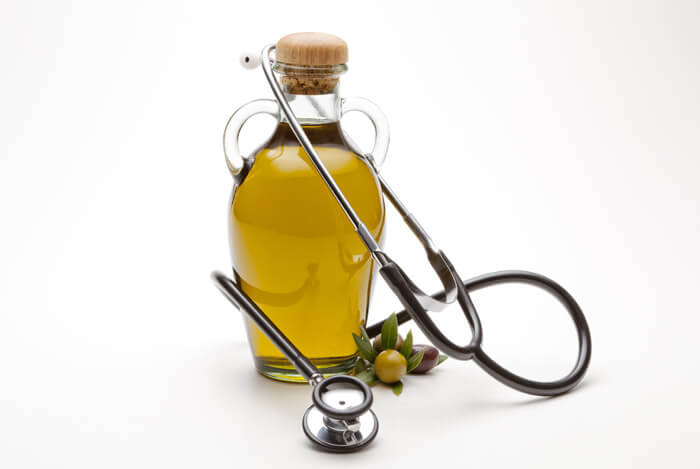
The incidence of cancer in Mediterranean countries is lower than in Scandinavian countries, the United Kingdom, and the United States prompting researchers to question whether diet plays a role in this reduced risk.
I’ve already mentioned how olive oil is loaded with antioxidants, substances believed to play a pivotal role in killing cancer cells.
And, studies have shown they do just that!
Take oleocanthal – it has been shown to kill cancer cells in less than an hour, according to a 2015 study, published in the journal Molecular & Cellular Oncology.
Under normal conditions, cells die in anywhere from 16 to 24 hours. Oleocanthal caused them to do so within a 30 to 60-minute window.
Other 2015 research has shown promise when it comes to breast cancer.
4,000 women, between the ages of 60 and 80, were asked to follow either the Mediterranean diet with olive oil diet or a control diet for six years.
Those following the Mediterranean diet had a 68% lower relative risk of developing breast cancer in the 5 years after the study, compared with those in the control group.
Promotes Brain Health

Extra virgin olive oil may just help protect your brain against Alzheimer’s disease, the most common form of dementia, which causes problems with memory, thinking and behavior.
In people with Alzheimer’s, there is a buildup of proteins (beta amyloids) in certain parts of the brain.
Extra virgin olive oil was shown to clear these beta amyloid proteins from the brains of mice, thus helping to prevent Alzheimer’s.
In humans, a Mediterranean diet which includes olive oil has been shown to promote cognitive function.
Treats Rheumatoid Arthritis

Given that rheumatoid arthritis (RA) is an inflammatory condition, and we already know that olive oil is a potent anti-inflammatory, it’s reasonable to conclude that olive oil can relieve the pain and swelling associated with RA.
Science backs this up – albeit in a small number of studies.
For example, 2014 research carried out in Spain points to the Mediterranean diet decreasing both the pain and disease activity associated with RA – with olive oil being seen to reduce inflammatory markers and stop oxidative stress.
What’s more, in one 24 week-long study, taking olive oil along with fish oil improved joint pain intensity, hand grip strength, duration of morning stiffness and onset of fatigue in RA sufferers.
A Good Choice for Cooking
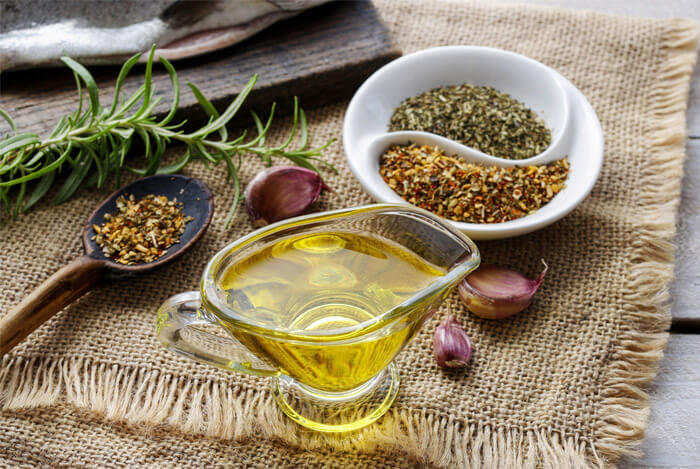
While plenty of oils taste good, some are better than others for cooking.
Some oils can’t withstand very high temperatures, and begin to smoke, emitting toxic fumes and free radicals.
Researchers have looked at olive oil’s ability to stand up under extreme heat.
In one study, several types of olive oil were fried for 24 hours. Scientists found that the olive oil was highly resistant to oxidation, with extra virgin olive oil faring even better.
Another study looked at the oxidation of sunflower oil and olive oil during forty non-consecutive frying periods.
During the first twenty frying periods, the olive oil proved much more stable than the sunflower oil, but after that the differences decreased between the two.
Bottom line – olive oil is likely safe for frying as long as you change the oil in the pan after every cooking period.
Maintains a Healthy Weight
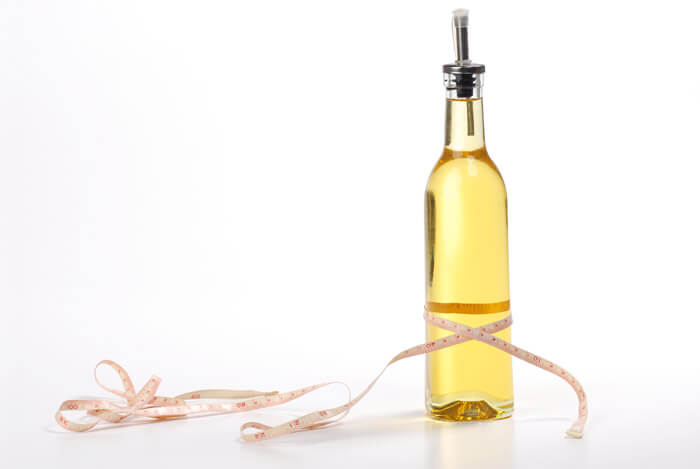
Eating fat doesn’t make you fat, but eating too many calories, does.
Despite eating lots of olive oil, a 2-year study of over 1,100 elderly people found that those who follow a Mediterranean diet have an 88% lower risk of obesity.
This is most likely thanks to a higher intake of fruits, vegetables, and grains, but it does show how moderate mounts of healthy fats don’t make you fat.
An even larger study of 7,368 Spanish university graduates followed for over 2 years, showed that a high amount of olive oil consumption is not associated with higher weight gain or a significantly higher risk of becoming overweight or obese.
Prevents Type-2 Diabetes

Type 2 diabetes is a growing epidemic in the US, with 1 in every 3 Americans expected to suffer from it by 2050.
Olive oil, like certain other fats, can have a stabilizing effect on blood sugar and insulin levels, meaning it could help you stave off this hard-to-manage condition.
In a trial of 418 non-diabetic subjects, those eating a Mediterranean diet with olive oil had more than a 40% lower risk of developing diabetes than those in the control group.
A more recent, 2015 study backs up these findings where 25 participants were given a typical Mediterranean lunch, consisting of fruits, vegetables, grains and fish, on two separate occasions.
With the first meal, the researchers added 10 g of extra virgin olive oil, and with the second 10 g of corn oil.
After each meal, blood glucose levels were tested with the olive oil causing a much smaller rise in levels than did the corn oil.
Final Thoughts

As you can see, olive oil contains a lot of beneficial substances and confers a number of health benefits, meaning it may just be one of the healthiest oils around!
Make sure you always choose extra virgin olive oil for the full nutrient load, and strive to buy the best quality oil you can.
Of course, don’t forget that fats are still fats and extra virgin olive oil packs in 120 calories per tablespoon…so go easy on this liquid gold!
What’s your take on olive oil? Have anything else you’d like to share? Let me know in the comments below!
Scientific References +
- Violi, F., Loffredo, L., Pignatelli, P., Angelico, F., Bartimoccia, S., Nocella, C., Cangemi, R., Petruccioli, A., Monticolo, R., Pastori, D., & Carnevale, R. (2015). Extra virgin olive oil use is associated with improved post-prandial blood glucose and LDL cholesterol in healthy subjects. Nutrition & Diabetes 2015 5:7, 5(7), e172–e172. https://doi.org/10.1038/nutd.2015.23
- Salas-Salvadó, J., Bulló, M., Babio, N., Martínez-González, M. Á., Ibarrola-Jurado, N., Basora, J., Estruch, R., Covas, M. I., Corella, D., Arós, F., Ruiz-Gutiérrez, V., Ros, E., & Investigators, for the P. S. (2011). Reduction in the Incidence of Type 2 Diabetes With the Mediterranean Diet. Diabetes Care, 34(1), 14–19. https://doi.org/10.2337/DC10-1288
- M, B.-R., A, S.-V., C, de la F., J, de I., JA, M., & MA, M.-G. (2006). Olive oil consumption and weight change: the SUN prospective cohort study. Lipids, 41(3), 249–256. https://doi.org/10.1007/S11745-006-5094-6
- S, T., V, B., N, P., A, Z., F, A., E, G., G, M., E, P., C, L., & D, P. (2009). Adherence to the Mediterranean diet is associated with lower prevalence of obesity among elderly people living in Mediterranean islands: the MEDIS study. International Journal of Food Sciences and Nutrition, 60 Suppl 6(SUPPL. 6), 137–150. https://doi.org/10.1080/09637480903130546
- Bastida, S., & Sánchez-Muniz, F. J. (2016). Thermal Oxidation of Olive Oil, Sunflower Oil and a Mix of Both Oils during Forty Discontinuous Domestic Fryings of Different Foods: Http://Dx.Doi.Org/10.1106/1898-PLW3-6Y6H-8K22, 7(1), 15–21. https://doi.org/10.1106/1898-PLW3-6Y6H-8K22
- S, C., R, M., A, S., BP, O., & JA, P. (2010). Olive oil stability under deep-frying conditions. Food and Chemical Toxicology : An International Journal Published for the British Industrial Biological Research Association, 48(10), 2972–2979. https://doi.org/10.1016/J.FCT.2010.07.036
- H, E. (1993). Cytotoxicity and genotoxicity of lipid-oxidation products. The American Journal of Clinical Nutrition, 57(5 Suppl). https://doi.org/10.1093/AJCN/57.5.779S
- AA, B., CR, K., CL, A., T, M., & I, D. (2005). Supplementation of fish oil and olive oil in patients with rheumatoid arthritis. Nutrition (Burbank, Los Angeles County, Calif.), 21(2), 131–136. https://doi.org/10.1016/J.NUT.2004.03.023
- L, G. C., B, R.-R., & L, C.-C. (2014). [Importance of nutritional treatment in the inflammatory process of rheumatoid arthritis patients; a review]. Nutricion Hospitalaria, 29(2), 237–245. https://doi.org/10.3305/NH.2014.29.2.7067
- EH, M.-L., P, C., E, T., R, E., J, S.-S., B, S. J., A, S.-T., E, R., C, V.-P., & MÁ, M.-G. (2013). Mediterranean diet improves cognition: the PREDIMED-NAVARRA randomised trial. Journal of Neurology, Neurosurgery, and Psychiatry, 84(12), 1318–1325. https://doi.org/10.1136/JNNP-2012-304792
- Abuznait, A. H., Qosa, H., Busnena, B. A., Sayed, K. A. El, & Kaddoumi, A. (2013). Olive-Oil-Derived Oleocanthal Enhances β-Amyloid Clearance as a Potential Neuroprotective Mechanism against Alzheimer’s Disease: In Vitro and in Vivo Studies. ACS Chemical Neuroscience, 4(6), 973–982. https://doi.org/10.1021/CN400024Q
- Toledo, E., Salas-Salvadó, J., Donat-Vargas, C., Buil-Cosiales, P., Estruch, R., Ros, E., Corella, D., Fitó, M., Hu, F. B., Arós, F., Gómez-Gracia, E., Romaguera, D., Ortega-Calvo, M., Serra-Majem, L., Pintó, X., Schröder, H., Basora, J., Sorlí, J. V., Bulló, M., … Martínez-González, M. A. (2015). Mediterranean Diet and Invasive Breast Cancer Risk Among Women at High Cardiovascular Risk in the PREDIMED Trial: A Randomized Clinical Trial. JAMA Internal Medicine, 175(11), 1752–1760. https://doi.org/10.1001/JAMAINTERNMED.2015.4838
- LeGendre, O., Breslin, P. A., & Foster, D. A. (2015). (-)-Oleocanthal rapidly and selectively induces cancer cell death via lysosomal membrane permeabilization. Https://Doi.Org/10.1080/23723556.2015.1006077, 2(4). https://doi.org/10.1080/23723556.2015.1006077
- A, T., P, L., H, K., & D, T. (2000). Cancer and Mediterranean dietary traditions. Cancer Epidemiology, Biomarkers & Prevention : A Publication of the American Association for Cancer Research, Cosponsored by the American Society of Preventive Oncology, 9(9), 869–873. https://pubmed.ncbi.nlm.nih.gov/11008902/
- MA, M.-G., LJ, D., & M, D.-R. (2014). Olive oil consumption and risk of CHD and/or stroke: a meta-analysis of case-control, cohort and intervention studies. The British Journal of Nutrition, 112(2), 248–259. https://doi.org/10.1017/S0007114514000713
- L, S., & G, H. (2014). Monounsaturated fatty acids, olive oil and health status: a systematic review and meta-analysis of cohort studies. Lipids in Health and Disease, 13(1). https://doi.org/10.1186/1476-511X-13-154
- LA, F., AS, R., L, d’Episcopo, L, G., A, D. R., & T, M. (2000). Olive oil and reduced need for antihypertensive medications. Archives of Internal Medicine, 160(6), 837–842. https://doi.org/10.1001/ARCHINTE.160.6.837
- K, R., L, H., N, F., A, C., L, H., M, T., & S, S. (2013). “Mediterranean” dietary pattern for the primary prevention of cardiovascular disease. The Cochrane Database of Systematic Reviews, 2013(8). https://doi.org/10.1002/14651858.CD009825.PUB2
- Estruch, R., Ros, E., Salas-Salvadó, J., Covas, M.-I., Corella, D., Arós, F., Gómez-Gracia, E., Ruiz-Gutiérrez, V., Fiol, M., Lapetra, J., Lamuela-Raventos, R. M., Serra-Majem, L., Pintó, X., Basora, J., Muñoz, M. A., Sorlí, J. V., Martínez, J. A., & Martínez-González, M. A. (2013). Primary Prevention of Cardiovascular Disease with a Mediterranean Diet. Https://Doi.Org/10.1056/NEJMoa1200303, 10(2), 28. https://doi.org/10.1056/NEJMOA1200303
- L, S.-M., J, N. de la C., L, R., & JA, T. (2003). Olive oil and the Mediterranean diet: beyond the rhetoric. European Journal of Clinical Nutrition, 57 Suppl 1, S2–S7. https://doi.org/10.1038/SJ.EJCN.1601801
- C, R., E, M., J, V., M, B., & A, D. C. (2007). In vitro activity of olive oil polyphenols against Helicobacter pylori. Journal of Agricultural and Food Chemistry, 55(3), 680–686. https://doi.org/10.1021/JF0630217
- E, M., C, R., M, B., & A, D. C. (2007). Antimicrobial activity of olive oil, vinegar, and various beverages against foodborne pathogens. Journal of Food Protection, 70(5), 1194–1199. https://doi.org/10.4315/0362-028X-70.5.1194
- S, Y., K, M., S, S., K, Y., Y, M., M, I., T, K., Y, N., & H, N. (2007). Dietary intake of fatty acids and serum C-reactive protein in Japanese. Journal of Epidemiology, 17(3), 86–92. https://doi.org/10.2188/JEA.17.86
- LM, V., JE, R., & HH, T. (1997). The potent antioxidant activity of the vitamin K cycle in microsomal lipid peroxidation. Biochemical Pharmacology, 54(8), 871–876. https://doi.org/10.1016/S0006-2952(97)00254-2
- M, de B., EB, T., JG, D., HV, H., PL, H., & WS, C. (2013). Human absorption and metabolism of oleuropein and hydroxytyrosol ingested as olive (Olea europaea L.) leaf extract. Molecular Nutrition & Food Research, 57(11), 2079–2085. https://doi.org/10.1002/MNFR.201200795
- Tripoli, E., Giammanco, M., Tabacchi, G., Majo, D. Di, Giammanco, S., & Guardia, M. La. (2005). The phenolic compounds of olive oil: structure, biological activity and beneficial effects on human health. Nutrition Research Reviews, 18(1), 98–112. https://doi.org/10.1079/NRR200495










